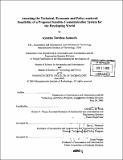Assessing the technical, economic and policy-centered feasibility of a proposed satellite communication system for the developing world
Author(s)
Samuels, Ayanna Terehas
DownloadFull printable version (16.60Mb)
Other Contributors
Massachusetts Institute of Technology. Technology and Policy Program.
Advisor
Olivier L. de Weck.
Terms of use
Metadata
Show full item recordAbstract
Satellite communication systems remain one of the most under utilized development mediums in less industrialized countries. This research proposes to establish a low cost satellite communications system tailored specifically for the developing world (+/- 30⁰ latitude). The technical, economic and policy related frontiers of the problem are integrated within a MATLAB based satellite communication constellation simulation which is used to assess the feasibility of the proposed satellite system. The analysis demonstrates that with technical advances that would allow higher capacity systems at lower costs and a renewed policy framework in line with the present state of the satellite system industry, it could be feasible to establish a low earth orbit satellite communications system for the developing world. The inputs to the satellite simulation are the proposed system's desired design variables and other relevant parameters. The outputs are system performance, capacity and cost. The Pareto optimal solution trade space is generated by the simulation model using a full-factorial run that probes the entire design space. The application of choice is short messaging services (SMS), chosen for its ability to provide proven connectivity at moderate costs. The capacity and cost of the most ideal Pareto architecture is contrasted against demand in the defined developing world region. The simulation also accounts for the necessary policy considerations and assesses the feasibility of the proposed system amidst the existing industry policy and regulatory framework. Additionally, data regarding the current economic standing of the region and how this forms an underlying basis for the digital divide is presented and assessed. (cont.) The policy and regulatory constraints on the acceleration of telecommunications development throughout the developing world are discussed. This thesis elaborates upon the need for a focus on design for affordability if satellite communication systems are to realize their immense potential for the delivery of needed social services to the world's marginalized.
Description
Thesis (S.M.)--Massachusetts Institute of Technology, Dept. of Aeronautics and Astronautics; and, (S.M.)--Massachusetts Institute of Technology, Sloan School of Management, Technology and Policy Program, 2005. Includes bibliographical references (p. 213-217).
Date issued
2005Department
Massachusetts Institute of Technology. Department of Aeronautics and Astronautics; Technology and Policy Program; Sloan School of ManagementPublisher
Massachusetts Institute of Technology
Keywords
Aeronautics and Astronautics., Technology and Policy Program.